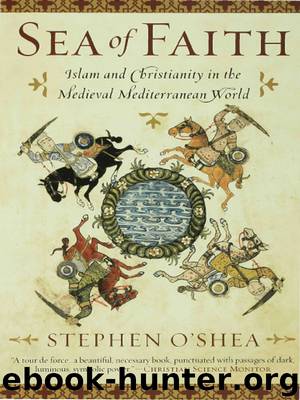Sea of Faith by Stephen O'Shea

Author:Stephen O'Shea
Language: eng
Format: epub
Publisher: Bloomsbury Publishing Plc
Published: 2009-09-21T16:00:00+00:00
The Almoravids, whose empire stretched from the river Niger to La Mancha and from the Algarve to Libya, disappeared from Spain in the middle years of the twelfth century. The hot flame of religious fervor that had animated these Berbers of the ribat had guttered once it came in contact with the refined air of al-Andalus. The Almoravid monarchs, if not their foot soldiers, became as worldly as the latter taifa kings. On doctrinal matters, a literalist, legalistic reading of the Quran—as taught by Almoravid clerics—did not sit well with the native Andalusis; nor did, especially, the ethnic humiliation entailed in being ruled from Marrakesh by Berbers. As early as the 1120s, revolts in the Guadalquivir Valley had become commonplace.
However dangerous such Andalusi irredentism, the fatal blow was delivered in Africa: the Almoravids had to face a rival Berber federation centered on the Masmuda clan of the Atlas Mountains of Morocco. Begun—as had the Almoravid movement—by a holy man returning from an initiatory trip to the east, this new force would eventually crush the Almoravids. Ibn Tumart, the Masmuda visionary, preached such a radical monotheism that his supporters were known as the Unitarians, or al-muwahhidun (whence the western word Almohad'). The Almohads detested the Almoravids, claiming that their pedestrian approach to Revelation had led them into the heresy of ascribing anthropomorphic attributes to the unknowable essence of God. The Quran, the Almohads argued, should be interpreted collectively by the sages leading the community of the faithful. Ibn Tumart, as shrewd and ruthless as the Prophet had been in cementing the umma behind him, allowed himself to be declared a mahdi—an infallible emissary of God sent to purify Islam. Armed with this ferocious certitude, the Almohads roared out of the Atlas to eliminate the Almoravids. By the 1150s the Almohad caliph—Ibn Tumart's successor—was ensconced in the palaces of Marrakesh.
The transfer of power in Spain took rather longer, as Iberia was not central to the concerns of the new Berber dynasts. The Almohads first wanted to consolidate their hold on the Maghrib and Ifriqiya—their armies drove the Norman Sicilians of King Roger from the coastline of Tunisia. As these conquests unfolded, in al-Andalus the decades following the midcentury mark saw a period of confusion, a second era of taifas, as Almohad emissaries and Almoravid loyalists waged war from rival cities, all the while trying to counter Andalusi rebels eager to compose with the Christian northerners, their fellow Iberians.
The rebels' greatest figure was one Ibn Mardanish, called King Lobo (Wolf ) by the Christians, an accomplished juggler of alliances who successfully parried repeated attacks on his eastern kingdom of Valencia and Murcia. On his death in 1172, however, his sons submitted to the Almohads. Although many Andalusis of Lobo's generation were willing to become vassals of either Castile or the Crown of Aragon in exchange for a measure of self-rule, the Almohads eventually turned the situation to their own advantage, relying on the confessional zeal of volunteer mujahadeen and on the hardening of religious atttitudes among the Muslim Andalusis.
Download
This site does not store any files on its server. We only index and link to content provided by other sites. Please contact the content providers to delete copyright contents if any and email us, we'll remove relevant links or contents immediately.
| Hadith | History |
| Law | Mecca |
| Muhammed | Quran |
| Rituals & Practice | Shi'ism |
| Sufism | Sunnism |
| Theology | Women in Islam |
The History of Jihad: From Muhammad to ISIS by Spencer Robert(2622)
Nine Parts of Desire by Geraldine Brooks(2361)
The Turkish Psychedelic Explosion by Daniel Spicer(2355)
The First Muslim The Story of Muhammad by Lesley Hazleton(2268)
The Essential Rumi by Coleman Barks(2043)
1453 by Roger Crowley(2024)
The Last Mughal by William Dalrymple(1855)
Trickster Travels: A Sixteenth-Century Muslim Between Worlds by Davis Natalie Zemon(1847)
Muhammad: His Life Based on the Earliest Sources by Martin Lings(1644)
God by Aslan Reza(1639)
by Christianity & Islam(1629)
A Concise History of Sunnis and Shi'is by John McHugo(1567)
No God But God by Reza Aslan(1541)
Magic and Divination in Early Islam by Emilie Savage-Smith;(1533)
The Flight of the Intellectuals by Berman Paul(1502)
Nothing to Envy by Barbara Demick(1445)
Art of Betrayal by Gordon Corera(1429)
What the Qur'an Meant by Garry Wills(1391)
Getting Jesus Right: How Muslims Get Jesus and Islam Wrong by James A Beverley & Craig A Evans(1340)
